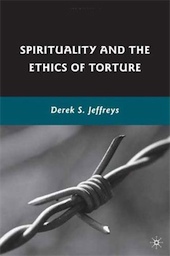While a great volume of material has been published about torture from a political or legal perspective, there have been relatively few publications addressing the spiritual and moral dimensions of the issue. University of Wisconsin professor Derek S. Jeffreys tries to fill the gap with a new book entitled Spirituality and the Ethics of Torture. I put six questions to Prof. Jeffreys about his book.
1. You write that “we cannot adequately comprehend the immorality of torture without considering our inner life”—suggesting your view that religious values are indispensible to resolution of the torture debate. But polling shows that frequent churchgoers, particularly those who identify themselves as evangelicals, are high among the groups most likely to accept torture. How do you explain this?

Human beings are remarkable creatures who can intellectually transcend their environment, develop an inner self-possession, and give unselfishly to others. These spiritual qualities give them a moral dignity that no government can remove. Sadly, both religious and non-religious people often disregard it. Some evangelicals strongly oppose torture, but as you note, many churchgoers also support it. They ignore their own rich spiritual traditions and adopt standard secular ways of thinking about torture. National security concerns, ticking bomb scenarios, and nationalism are deeply seductive. We need to challenge them by retrieving neglected spiritual ideas and practices. What’s clear also is that those of us opposing torture have a lot more work to do in churches, synagogues, and mosques.
2. Jean Elshtain and neocon writers like Charles Krauthammer object strongly to those who reject torture on purely moral grounds saying that they are guilty of self-indulgence—putting the purity of their conscience ahead of the safety and security of the community. How do you respond to this argument?
In an age where politicians arrogantly dismiss the past and claim we face entirely new situations, we might benefit from a previous generation’s wisdom… [W]e must counter evil by retaining the deepest elements of our spirituality. With them we can reject the manipulation of memory prominent in the War on Terror. We can resist torture’s assault on the human spirit and display our compassion for those it harms. Above all, we can recall our dignity as embodied spirits capable of seeking what is true and good in our world.
—From Spirituality and the Ethics of Torture
Reprinted by permission of the publisher, Palgrave Macmillan. Copyright (c) 2009 Derek Jeffreys
The self-indulgence argument is emotionally powerful but philosophically flawed. Some people opposing torture are squeamish about violence and value their moral purity over the community’s welfare. We shouldn’t elect them to public office. However, others rejecting torture aspire to live in a community that respects the dignity of all persons. They struggle to institutionalize this respect in our institutions. For example, many military leaders think torture is incompatible with American values. We demean their efforts to ban it by calling them self-indulgent. I hope we can stop casting this aspersion and begin to consider more serious ethical issues.
3. Elshtain and Krauthammer, among others, also defend torture on purely consequentialist grounds—essentially arguing that “torture works,” and that it would therefore be foolish to withdraw it entirely from the arsenal of tools available to the state. Is this consequentialist argument sustainable or are they missing something?
Consequences are important in our lives, but consequentialism holds that they should determine an act’s moral quality. On this view, we can justify torture by showing how it protects lives or exhibits our political power. Despite its popularity, consequentialism is fatally flawed because it assumes we can precisely measure consequences. We can roughly calculate them, but our record of economic and other calculations is often quite poor. Moreover, we cannot quantify spiritual realities like love and beauty. For example, we cannot divide and measure our experiences of listening to Mozart’s music. Once we include spiritual values in public policy considerations, consequentialism falls apart. Grounding an ethic in a person’s dignity provides a far more secure foundation for political and social life.
4. You fashion an argument against the consequentialists and in favor of an absolute rule of prohibition drawing on the writings of Friedrich von Hayek. Can you draw this out for us?
Hayek famously opposed state-controlled economies by arguing that states lack the information necessary to make large-scale decisions. They possess little knowledge of local conditions, and cannot predict how multiple actors will interact. I don’t share all of Hayek’s views, but use him to show that we can’t know if torture “works” as an institution. In one case, it might produce valuable intelligence, while in another it might yield false information that leads to rash actions. Given multiple cultures and institutions, we cannot say with confidence that torture produces good consequences. Some social scientists and policy-makers hope that analytic and technological tools will enhance our predictive powers. In contrast, I think our ignorance of consequences remains endemic to social and political life.
5. The “dirty hands” approach, which Michael Walzer derived from Max Weber, Albert Camus, Niccolò Machiavelli, and others, suggests that a political leader may have to violate moral rules in the interest of protecting the state. It also suggests that a good leader must be prepared to suffer the penalty for such actions, a point which Machiavelli made with a celebrated anecdote from the life of Cesare Borgia. But the accepted wisdom of the Beltway is that political leaders can’t be held to account for torture because to do so would disturb the equilibrium of the political system. Is this an ethically sustainable position?

For years, I struggled with the dirty hands view, and I still find its picture of moral ambiguity in politics attractive. Political leaders face terrible moral dilemmas that sometimes seem insoluble. I have come to believe, however, that the dirty hands view offers no guidance for statecraft and leaves leaders too much leeway for decision-making. The classic dirty hands position holds that leaders incur moral guilt for the sake of the community. The dirty hands thinker should therefore be consistent, and demand that Bush Administration officials accept penalties for their acts. Trials or public inquiries about torture can dangerously disturb the political system’s equilibrium. Nevertheless, political stability often masks profound injustice, and justice demands that we hold torturers responsible for their actions.
[Machiavelli] extols the brutal action of Cesare Borgia, the son of a Renaissance pope. Confronting disorder in Romagna, Borgia appointed Messer Remirro de Orca to suppress it. A “cruel and efficient man,” de Orca soon stamped out chaos. Pretending to be shocked by his action, Borgia publicly executed de Orca by having him “placed one morning in Cesena on the piazza in two pieces with a piece of wood and a bloodstained knife alongside him.” The atrocity of such a spectacle left those people at one and the same time satisfied and stupefied. With this example, Machiavelli recognizes torture’s expressive power, its capacity to simultaneously intimidate and fascinate a populace. Borgia’s action may appear cruel, he notes, but is really compassionate because it creates order and protects the innocent.
—From Spirituality and the Ethics of Torture
Reprinted by permission of the publisher, Palgrave Macmillan. Copyright (c) 2009 Derek Jeffreys
6. President Obama makes the argument that the nation must “move on” from the torture issue. But you make the argument that memory and institutions are essential for resolving the torture question. Explain your position.
We cannot “move beyond” torture because it remains with us in memory and in the lives of torture victims and perpetrators. We have tortured thousands of people, leaving them with deep psychological and physical scars. If we don’t try to heal them, the pernicious effects of torture will appear in anger, historical mendacity, and revenge. To counter this poison, we must honestly acknowledge that we tortured. Some Americans may find this admission difficult because they think our country is morally exceptional. Open discussions, media and university symposia, and other mechanisms can help us come to terms with the truth. In many countries, truth commissions have also been a valuable way to address torture’s aftermath. Carefully constructed, they cultivate a proper appreciation for torture’s horror. I am, therefore, deeply saddened that President Obama refuses to appoint a truth commission. The recent controversies over detainee abuse photographs and the International Committee of the Red Cross reports show that he cannot ignore torture’s legacy. I commend the president for renouncing torture, but wish he would more honestly deal with past crimes.



